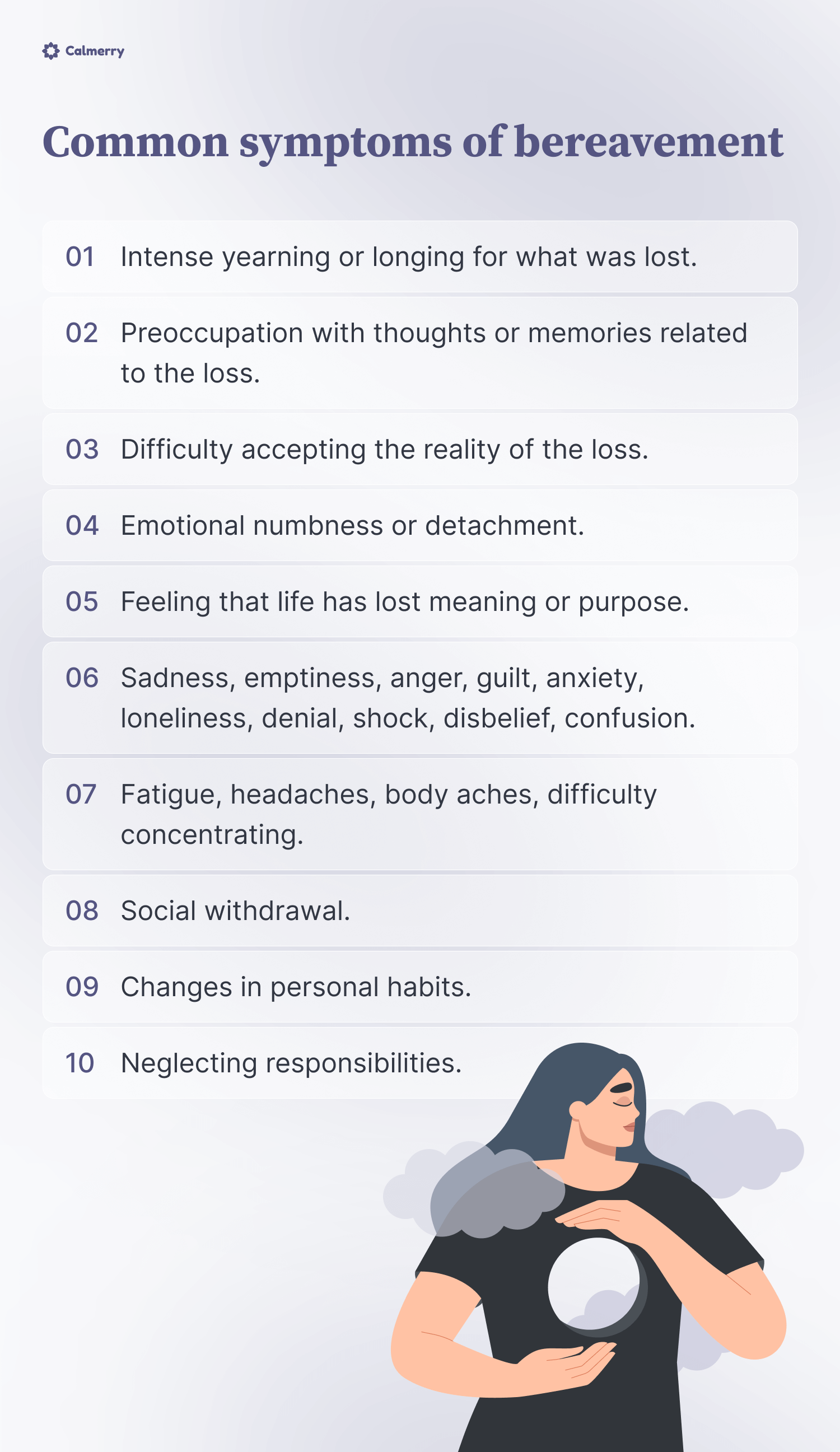Understanding Bereavement and Coping with the Loss of Someone or Something Significant

In this article
The world can feel a little off-kilter after losing someone or something dearly cherished. You might be experiencing a rollercoaster of emotions, from gut-wrenching sadness to waves of anger and confusion.
This intense mix of feelings is completely normal and a part of what’s called bereavement.
Bereavement is the state of having suffered a significant loss, and it’s not just limited to the death of a loved one.
Let’s explore bereavement and how you can navigate this challenging time.
Is bereavement the same as grieving?
Bereavement and grieving are often used interchangeably, but there’s a subtle difference between the two.
Bereavement refers to the period after a loss, while grieving is the emotional response to that loss. It’s the process of working through the complex web of feelings that arise after a significant loss.
While bereavement and grieving are closely linked, they represent distinct aspects of experiencing loss. Let’s break down the difference a little further:
Bereavement
Bereavement is the state of having suffered a loss and the period of time when you are grieving that loss. This is the factual aspect.
It acknowledges that you’ve experienced a significant absence in your life, whether it’s the death of a loved one, the end of a cherished relationship, the loss of a job that defined you, or even a beloved pet.
Bereavement simply states that a loss has occurred.
Grieving
On the other hand, grieving is the emotional response to the loss. This is the internal experience.
It encompasses the full range of emotions that surface in response to the loss. Grief can manifest as sadness, anger, guilt, confusion, loneliness, and even physical symptoms like fatigue or changes in appetite.
Grieving is the dynamic process of acknowledging the loss, processing your emotions, and eventually learning to live with the absence.
Think of bereavement as the umbrella term that encompasses the entire situation of loss. And grieving – as the specific emotions you experience under that umbrella.
– Veronica Silver, Therapist-turned mental health writer
Bereavement can result from various types of significant losses
Life is full of changes, and sometimes those changes involve loss. While bereavement is often associated with the death of a loved one, it can stem from a wider range of significant losses that leave a profound emotional impact.
Here are some examples:
- Death – the loss of a spouse, parent, child, sibling, friend, or any close relationship can trigger bereavement.
- Relationship breakdown – divorce, separation, or the end of a significant romantic relationship can lead to feelings of loss and grief.
- Loss of a pet – pets become cherished family members, and the loss of a pet can be incredibly painful.
- Job loss – losing your job can be distressing, not just financially, but also to your sense of identity and purpose.
- Loss of health – a serious illness or disability can be a significant loss, forcing you to adjust to a new normal and potentially grieve the life you once had.
- Loss of security – events like a natural disaster, fire, war, or financial hardship can lead to a loss of security, home, or possessions, triggering grief and displacement.
- Miscarriage or stillbirth – losing a pregnancy can be a deeply painful experience, filled with grief and a sense of incompleteness.
- Loss of a dream or goal – giving up on a long-held dream or aspiration can be a significant loss that requires processing and adjustment.
Examples of bereavement
To illustrate the concept of bereavement beyond the types one might experience, here are some specific scenarios:
- A young woman grieves the sudden death of her father, their close bond leaving a gaping hole in her life. (Highlighting bereavement due to death).
- An older couple navigates the complicated emotions of downsizing their home and saying goodbye to a lifetime of memories. (Bereavement due to a change in a living situation).
- A talented athlete grapples with the loss of their career due to a sports injury. (Bereavement related to loss of ability).
- A family struggles to cope with the emotional and financial strain of a parent’s terminal illness. (This demonstrates bereavement arising from a combination of loss and anticipation of death).
This list is not exhaustive. These examples give just a tiny snippet of how bereavement manifests in various situations, each with its unique challenges and emotions.
Common symptoms of bereavement
Grief hits everyone differently. The emotional rollercoaster of bereavement can manifest in various ways.

Here are some common symptoms you might experience:
- Emotional symptoms: sadness, emptiness, anger, guilt, anxiety, loneliness, denial, shock, disbelief, confusion.
- Physical symptoms: fatigue, changes in appetite or sleep patterns, headaches, stomachaches, body aches, difficulty concentrating.
- Behavioral symptoms: social withdrawal, changes in personal habits, difficulty making decisions, neglecting responsibilities. [1] Moore, L. (2021, September 10). What are the symptoms of bereavement? Psych Central. https://psychcentral.com/disorders/bereavement-symptoms#symptoms
Here are some additional symptoms that can be particularly intense during bereavement:
Intense yearning or longing for what was lost
This feeling can be overwhelming. You might find yourself constantly thinking about the person or thing you’ve lost and reliving cherished memories.
It’s like a part of you is missing, leaving a constant ache in your heart.
Preoccupation with thoughts or memories related to the loss
Your mind may be flooded with memories, both positive and negative. You might find yourself replaying conversations, events, or missed opportunities. This is a natural part of processing the loss, but it can be emotionally draining.
Difficulty accepting the reality of the loss
Especially in the initial stages of grief, you may struggle to believe that the loss has truly happened. This denial can be a temporary coping mechanism, but it’s essential to face the reality of the situation eventually.
Emotional numbness or detachment
As a way to shield yourself from overwhelming pain, you might shut down your emotions and feel numb or disconnected from the world around you.
This can be a helpful way to cope in the short term, but it can hinder the grieving process if it persists for too long.
Feeling that life has lost meaning or purpose
The loss may leave you questioning your identity, values, and goals. You might wonder what comes next and struggle to find meaning in life without what you’ve lost.
Bereavement is a personal experience. You may not experience all these symptoms, and the intensity and duration can vary greatly.
– Veronica Silver, Therapist-turned mental health writer
9 ways to cope with bereavement
The path through bereavement is unique for everyone. There’s no right or wrong way to grieve; healing takes time and process.
While coping with the loss of a loved one, there will be moments of intense sadness and longing, but there will also be periods of acceptance and even joy.
Here are some strategies that may help you navigate this challenging time:
1. Allow yourself to feel
Don’t try to suppress your emotions. Bottling up your feelings can hinder healing. Acknowledge your pain, sadness, anger, or confusion. Let yourself cry, scream into a pillow, or express your emotions in a healthy way, like journaling.
2. Find comfort in rituals and traditions
Creating rituals or participating in traditions that connect you to the memory of the person or thing you’ve lost can be a source of comfort.
This could involve visiting their favorite spot, writing them a letter, planting a memorial tree, or sharing stories with loved ones.
3. Seek support from your community
Don’t isolate yourself. Surround yourself with supportive friends, family members, or a therapist who can offer a listening ear and understanding. Talking about your loss can be incredibly cathartic and help you process your emotions.
4. Embrace the power of self-compassion
Be kind to yourself during this difficult time. Don’t expect yourself to bounce back immediately.
Grieving takes time, and there will be good days and bad days – practice self-compassion by taking breaks, prioritizing activities you enjoy, and treating yourself with kindness. [2] Self-Compassion. (2024, March 11). Self-Compassion practices: Cultivate inner peace and joy – Self-Compassion. https://self-compassion.org/self-compassion-practices/
5. Set realistic goals
Setting realistic goals during the bereavement process can be a vital coping strategy. It involves breaking down your larger objectives into smaller, manageable tasks, which can help provide a sense of control and accomplishment when many aspects of life may feel overwhelming.
Begin with very small, achievable goals. These could be as simple as getting out of bed by a specific time, preparing a meal, or taking a short walk. The key is to set goals that are doable without adding significant stress.
This also means learning to acknowledge your limits. Grieving can drain your emotional and physical energy.
Recognize that your productivity and ability to handle tasks may not be what they were before your loss. Adjust your expectations accordingly to avoid setting yourself up for disappointment.
6. Considers spiritual activities
For those who are spiritual, engaging in spirituality can be a meaningful way to cope with bereavement. These activities can offer comfort, a sense of connection to something greater, and a context for understanding loss.
Many find solace in prayer as it can be a way to express pain, seek comfort, or feel a connection to a deceased loved one. Depending on one’s faith, prayer can be personal or part of a community practice.
Practices such as meditation and mindfulness can also help manage the intense emotions that come with grief. They foster a state of calm and present-mindedness, helping to alleviate stress and anxiety.
Being involved in religious services can provide a sense of community and belonging. These services often involve rituals that can bring comfort and a feeling of continuity with past generations.
Many also find spirituality in connection with the natural world. Activities like walks in nature, gardening, or simply spending time in nature can evoke a sense of peace and interconnectedness.
7. Educate yourself on the grieving process
Grief can feel overwhelming, but learning about it can be a powerful first step. Reading books, articles, or even watching documentaries can help you understand the emotional, physical, and mental ups and downs of loss.
It’s normal to feel confused and isolated, and knowing these are typical reactions can be a huge comfort.
– Veronica Silver, Therapist-turned mental health writer
8. Take a bereavement leave at work
Many workplaces offer bereavement leave to allow employees time to grieve and attend funeral services. Don’t hesitate to utilize this benefit if it’s available to you.
Taking time away from work can provide much-needed space to process your emotions and begin to heal.
9. Seek professional help if needed
Don’t hesitate to seek professional guidance from a therapist or grief counselor if you’re struggling to cope. Grief counseling can provide valuable support, tools, and strategies to help you navigate the complexities of grief and move forward in a healthy way.
Healing is a journey, not a destination. Be patient with yourself, and know that support is available to help you through this difficult time.
When to talk to a therapist
While grief is a natural response to loss, there are times when seeking professional help may be beneficial.
Here are some signs that you might benefit from therapy or grief counseling:
- Your grief feels overwhelming and interferes with your daily life. You struggle to function at work, maintain relationships, or care for yourself.
- You experience intense or prolonged feelings of sadness, anger, guilt, or anxiety. These emotions persist and prevent you from moving forward.
- You have difficulty accepting the reality of the loss. You’re stuck in denial or disbelief.
- You’re experiencing physical symptoms related to grief, such as persistent fatigue, changes in appetite or sleep, or unexplained body aches.
- You have thoughts of harming yourself or others.
If you’re experiencing these signs, please know you’re not alone. There is help available. Consider reaching out to a therapist who specializes in grief counseling.
In addition to traditional in-person therapy, there are also options for online grief counseling, which can offer flexibility and convenience.
For example, at Calmerry, we have available grief counselors. We will match you with the best-fit one for you within 1 hour.
You can have text or live video sessions from any place and anytime.
Moore, L. (2021, September 10). What are the symptoms of bereavement? Psych Central. https://psychcentral.com/disorders/bereavement-symptoms#symptoms
Self-Compassion. (2024, March 11). Self-Compassion practices: Cultivate inner peace and joy – Self-Compassion. https://self-compassion.org/self-compassion-practices/
online therapy
live video session



